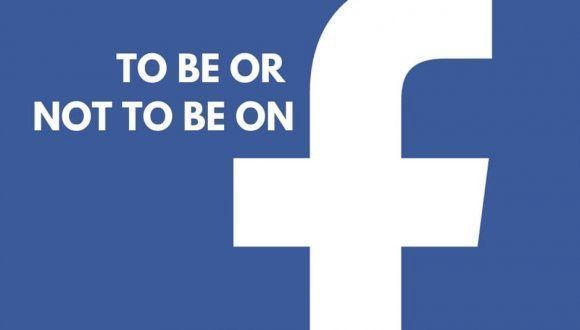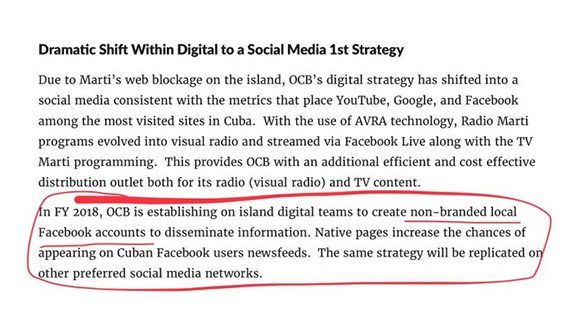
Will Facebook close the fake accounts of Radio and TV Marti?
Cuban journalist. First Vice-President of UPEC and Vice-President of FELAP. She is a Doctor in Communication Sciences and author or co-author of the books “Antes de que se me olvide“, “Jineteros en La Habana”, “Clic Internet” and “Chávez Nuestro”, among others. He has been awarded the “Juan Gualberto Gómez” National Journalism Prize on several occasions. Founder of Cubadebate and its Editor-in-Chief until January 2017. On twitter: @elizalderosa
Translated and edited by Walter Lippmann for CubaNews.
The new digital platforms favor the emergence of groups of individuals organized like a claque, ready to unconditionally applaud the one who pays. Anyone who isn’t in a blockaded country like Cuba can create content, invest in it for specific groups to see and even rent or buy virtual applause to generate “likes” on Facebook or “followers” on Twitter.
This is the business model of these technology platforms, thanks to which, for example, in the first quarter of 2018 Facebook had a turnover of $11.79 billion, almost four billion more (49 percent) than a year ago. Of that total, about 98.5 percent comes from advertising.
Such a thing happens every day and it is difficult to generate a perception of popularity on networks without hundreds of thousands of followers. These are usually achieved by registering artificial identities that promote messages of support, and the favor is not free. There are hundreds of companies that offer this service without any complexes. Simply enter “buy followers” in any search engine to find them. And it is not expensive: the price of a thousand followers is between 15 and 20 dollars. Getting ten thousand more people to follow us costs less than $120.
“Troll farms” – editors responsible for spreading false information on the Internet – have been used by politicians, entertainment stars, American spies, Donald Trump’s campaign team, Macri’s campaign team, the British military, Israeli propaganda organizations and many others who have made these huge profits from the platform founded by Mark Zuckerberg possible and placed it among the ten largest companies in the world, according to its value on the stock exchange.
The numbers are impressive and not just for the profits: a study published in March 2017 by the universities of South Carolina and Indiana estimated that, within Twitter, the proportion of “troll farms” that use automated applications to replicate messages (known as bots) was between 9 percent and 15 percent of their total users. The number of automatically-controlled fake profiles is between 30 million and 48 million.
Not out of moral compulsion, but to tune in to Washington’s anti-Russian and anti-Iranian discourse, Facebook has been willing to shut down some “troll farms” and escape, even momentarily, from the wave of criticism that has fallen on it for buying and selling data without the consent of its more than 2.4 billion users. This is how hits decided to eliminate hundreds of accounts with “inauthentic behavior” on Tuesday, according to a press release
We eliminated 652 pages, groups and accounts for coordinated “non-authentic behavior” that originated in Iran and were targeted to people across multiple Internet services in the Middle East, Latin America, the United Kingdom and the United States.
But while Facebook eliminates foreign-generated fake accounts, allegedly of Russian or Iranian origin, it tolerates the U.S. government’s “troll farms” without any crisis of conscience. Before any of us had heard of this machinery of fake accounts, fake news and Cambridge Analytica – the London-based company that intervened in more than 200 elections by manipulating the users of Facebook – the Pentagon was already publicly boasting that it was using the blue thumb network as propaganda bait for its operations.
Defense One magazine reported in November 2016 that Michael Lumpkin, former director of the Global Engagement Center (GEC, Pentagon propaganda department), described how the Center used Facebook data to maximize the effectiveness of its operations:
“Using Facebook ads I can get an audience, choose Country X, a specific age group between 13 and 34, filter people who like Abu Bakr Al Baghdadi or any other group… and I can shoot and hit them directly with messages,” Lumpkin said. He stressed that with the right data, effective message targeting can be done with only pennies per click.
Yesterday, the Miami New Times, a weekly newspaper in Florida, released a document proving that a US government-funded broadcasting organization is creating fake Facebook accounts in disinformation operations. These are directed against a country, Cuba, that has not done the slightest damage to the United States and that cannot access the Facebook ad manager because of the US blockade laws.
The Broadcasting Board of Governors (BBG) will spend more than $23 million in fiscal year 2019 on its Office of Broadcasting to Cuba (OCB), which controls Radio and TV Martí, and its projects include no less than a troll farm.
According to the budget requested of Congress for 2019, OCB will use the money in fake Facebook accounts of the kind that it perfectly classifies as “non-authentic behavior” to promote regime change on the island.
Considering the disaster of inefficiency, waste and corruption that has accompanied Radio Martí and TV Martí in 33 years of existence at a cost of more than $800 million at the expense of the US taxpayer, the former head of the US Interests Office in Havana, Vicki Huddleston, echoed on Twitter the news of the digital propaganda project against the island, to which she added a phrase of contempt: “Same-old-same-old!!”.).
Will Facebook close the US government’s “non-authentic behavior” accounts, starting with those of Radio and TV Martí? To be or not to be, that’s the question, right, Zuckerberg?
(Taken from Cubaperiodistas)




You must be logged in to post a comment.